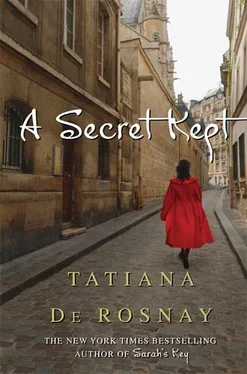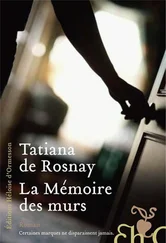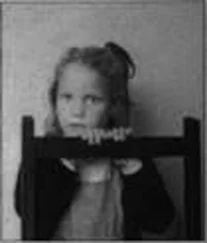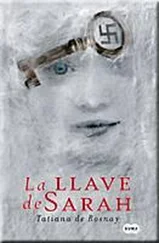For a long time I have felt like an Alcatraz inmate, desperately feeding on the scraps the wind sends my way-laughter, singing, and music, the hubbub of a crowd I can hear but will never see.

Afternoon of a dreary November day. Four weeks to Christmas. Paris is decked out in scintillating tinsel, like a gaudy courtesan. I am sitting at my desk, working on a complicated layout for the Bercy bank offices for the fifth time that morning. I keep having to reprint it. The printer makes a moaning noise like a woman in labor. Florence has a cold. I still have not had the heart to fire her. There is something profoundly pitiful about her. Today, she never seems to stop blowing her nose. Every time she does so, she thrusts sturdy Kleenex-covered index fingers up her nostrils and rotates them like propellers. I itch to reach out and swipe her across the face.
The past two months have been a whirlwind of conflicts and fights. Arno is in serious trouble at school. Astrid and I have been called in twice to talk with the teachers. If he goes on like this, we are warned, he will not only be held back, he’ll be expelled. Low grades, insolence, vandalization of school property, cutting class-we discover to our horror the extent of Arno’s dark deeds. How did our charming, easygoing son morph into this rebellious thug? As quiet as her brother is boisterous, Margaux is wrapped up in a cool world of silence and contempt. She hardly talks to us, wears her iPod day in and day out. The only way to communicate with her is to send her a text message, even if she is in the next room. Only Lucas remains reasonably agreeable. For the moment.
The only positive news around me right now, beside Angèle, is Mélanie’s speedy recovery. She now walks at a normal pace, with no hesitation, and regular exercise and physiotherapy have given her the extra strength she lacked. Getting back to work is not her priority. I guess she is making the most of her sick leave. She finally did go to Venice with the old beau, but there are new, younger men around her who seem never to stop taking her out to dinner, concerts, and openings.
I turn my back to the plastic Christmas tree squatting in the entrance, flashing green and red lights. Our second Christmas as a divorced couple is coming up. Astrid is in Tokyo with Serge, who has an “important sushi shoot” (the expression made Emmanuel hoot with laughter) for a glossy food catalog. She won’t be back for another week. The children are spending the entire week with me, and so far their stay has been a grueling one.
My mobile phone buzzes. Mélanie. We stay awhile on the phone, reviewing Christmas presents, who needs what, who would like what. We discuss our father. We both are convinced that he is ill in some sort of way, but he’s not telling us anything. When confronted, Régine replies flatly that she knows nothing. I once tried to get something out of Joséphine, but she admitted sheepishly that she hadn’t even noticed our father was looking that bad.
Mélanie teases me about Angèle. “Your Morticia” she calls her. I’ve already admitted to Mel, not that I have anything to hide, that this woman is what keeps me going right now. Even if I’ve managed to see her only a couple of times since the summer, Angèle is a new energy in my life. Yes, she is exasperatingly independent, yes, she probably sees other men, yes, she sees me only when she wants to, but she keeps my mind off my ex-wife. She has resuscitated my manhood in every sense of the word. All my friends have noticed a change. Since Angèle Rouvatier has waltzed into my life, I’ve lost weight, I’m cheerful, I’ve stopped complaining. I’m more careful about my clothes. I like my shirts very white, very crisp, my jeans, black now, like hers, perfectly cut. I wear a long black coat that Arno finds “cool” and that even Margaux looks upon with approval. And every morning I splash on the eau de cologne Angèle gave me, a zesty Italian fragrance that always makes me think of her, of us.
During my long conversation with Mel, a beep goes off in my phone. Call-waiting. I quip, “Hold on!” and glance at the screen. It is Margaux’s number. Margaux calls me so rarely that I tell my sister I need to take this call and I’ll get back to her later.
“Hi, this is your dad!” I say breezily to my daughter.
The only thing I hear in return is silence.
“You there, Margaux?”
A strangled sob. My heart starts to pump.
“Honey, what is it?”
Florence’s inquisitive, ferretlike face turns to me. I get up, walk briskly to the entrance of the office.
“Dad…”
Margaux seems to be miles away. Her voice is faint.
“Speak up, sweetie!”
“Dad!” Now she is screaming. The sound of it rips through my skull.
“What is it?”
My fingers tremble so much I almost drop the phone.
She is sobbing, the words tumbling out helter-skelter. I can’t make heads or tails of them. I say, “Margaux, honey, please calm down, I can’t understand you!”
Behind me, floorboards groan as Florence stealthily moves forward, not wanting to miss a word of this. I swivel around, confronting her with a glacial look. She freezes in midstep and cowers back to her desk.
“Margaux, talk to me. Please!”
I retreat to the entrance, finding shelter behind a large storage closet.
“Pauline is dead.”
“What?” I gasp.
“Pauline died.”
“But how?” I stutter. “Where are you? What happened?”
Her voice is flat now, devoid of all emotion.
“It happened during gym class just after lunch. She collapsed.”
My mind races. I feel helpless, confused. I scramble back to my desk, grab my coat, my scarf, my keys.
“Are you still at the gym?”
“No. We’re back at school. They took Pauline to the hospital. But it’s too late.”
“Have they called Patrick and Suzanne?”
“I guess so.”
I almost wish she would start crying again. I can’t stand her robotic voice. I tell her I will be right there. I don’t look at Florence as I rush out. I run to the school in a frantic daze.
In the back of my mind, I think, with utmost dread, Astrid is not here, Astrid is away, you are going to have to deal with this alone-you, the father, you, Daddy. You, the guy your daughter has hardly talked to for the past month, you, the guy she won’t even look at.
I don’t feel the cold. I run as fast as I can. My legs are like lead. My breath billows around me. My tar-filled lungs throb. Port Royal is twenty minutes away. When I get to the school, there are groups of teenagers and adults standing outside the building. Everybody has bleary, puffy eyes, upset expressions. I finally see Margaux. Her face is ashen, glistening with tears. People are queuing up to hug her, to cry with her, and at first I wonder why. Then it hits me. She was Pauline’s best friend. They’ve been going to this school since they were toddlers. That means more than ten years. Ten years in a fourteen-year-old life. A couple of teachers I know come up to talk to me. I mutter something, making my way through the crowd to my daughter. When I get to her, when I take her in my arms, she feels waiflike and fragile. I haven’t hugged her for such a long time.
“What do you want to do?” I ask her.
“I want to go home,” she replies very quietly.
I assume that given the circumstances, classes have been canceled. It is already four o’clock and dusk is setting in. She says goodbye to her friends, and we trudge along the avenue de l’Observatoire. The traffic is noisy, horns blaring, engines rumbling, but between us is only silence. What can I say to her? The words aren’t coming. I can only wrap my arm around her and hold her tight as we walk on. I suddenly notice that she is burdened with a couple of different bags. I try to pry one from her, to ease her load, but she savagely hisses, “No!” She hands another one to me, one I recognize, her familiar battered Eastpak. She holds on to the other one for dear life. It must be Pauline’s.
Читать дальше












